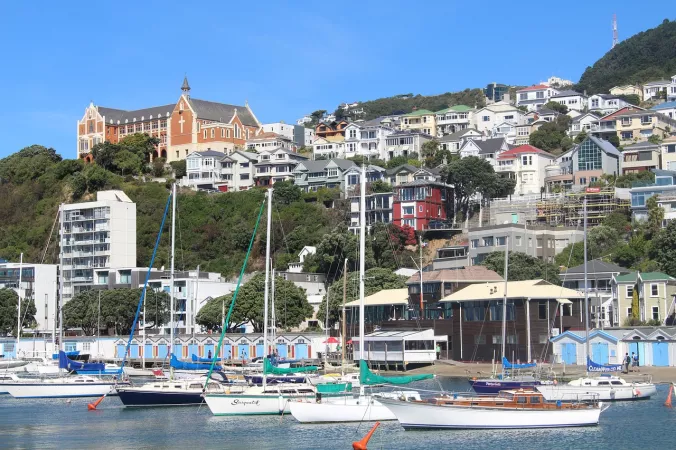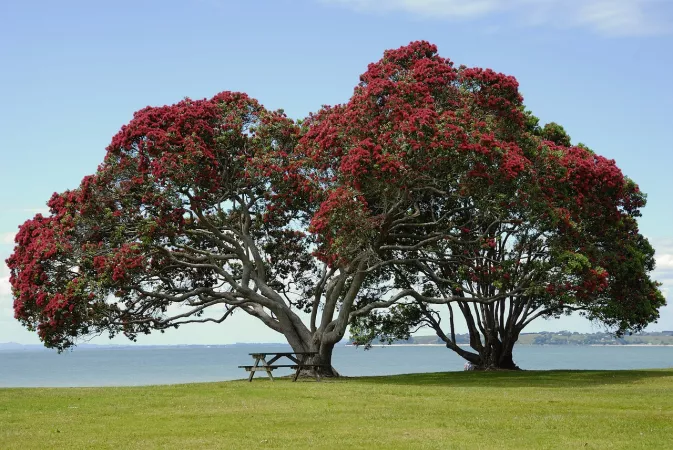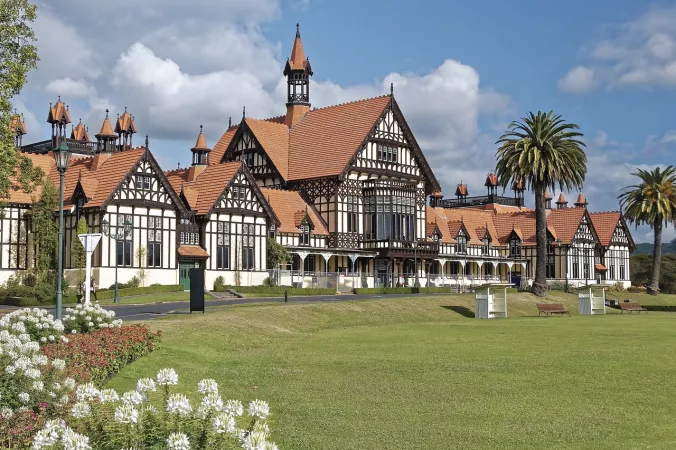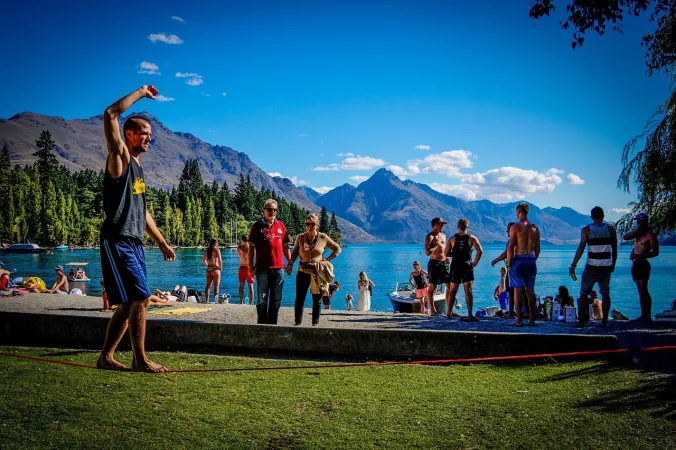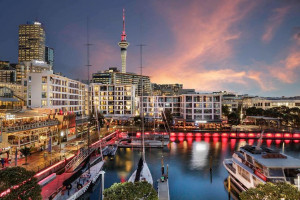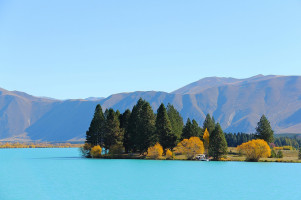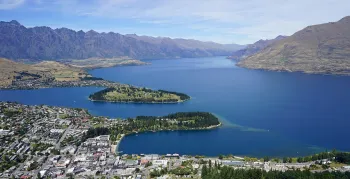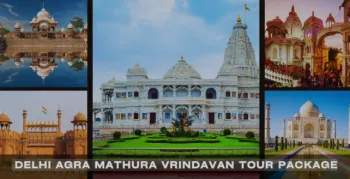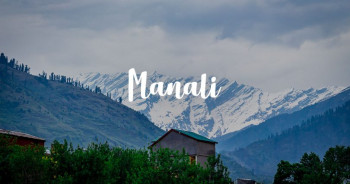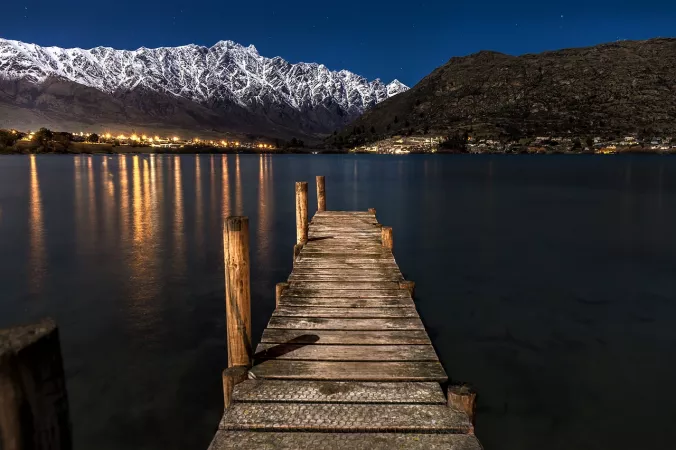
New Zealand
Duration
14 to 21 Days
14 to 21 Days
Best time to visit
Nov-Feb
Nov-Feb
Theme
Hill Station, Adventure, Waterfront, Beaches, Wildlife
Hill Station, Adventure, Waterfront, Beaches, Wildlife
New Zealand Travel Guide
New Zealand, located in the southwestern Pacific Ocean, is renowned for its stunning landscapes, ranging from mountains to beaches. The country is famous for being the filming location for the "Lord of the Rings" movies and its Maori culture. With a rich history and diverse geography, New Zealand offers a unique travel experience for visitors.Top Attractions in New Zealand
- Milford Sound
- Tongariro Alpine Crossing
- Bay of Islands
- Queenstown
- Waitomo Glowworm Caves
New Zealand is Famous for
Adventure sports and breathtaking natural beauty make New Zealand famous worldwide.Top Attractions in New Zealand
- Explore the stunning fjords of Milford Sound
- Hike the Tongariro Alpine Crossing for volcanic landscapes
- Visit the Bay of Islands for water activities
- Experience the adrenaline rush in Queenstown
- Marvel at the glowworms in Waitomo Caves
What's Great about Travelling to New Zealand?
- Adventure enthusiasts looking for adrenaline-pumping activities
- Nature lovers seeking picturesque landscapes
- Culture enthusiasts interested in Maori traditions
What's Not So Great about Travelling to New Zealand?
- Travelers not fond of long flights
- Those looking for bustling city life may find New Zealand too laid-back
- Budget travelers might find it expensive
Travel Tips for New Zealand
- Check visa requirements before traveling
- Renting a car is the best way to explore the country
- Be prepared for changeable weather conditions
Important New Zealand trip information
- Ideal Duration: 2-3 weeks
- Best Time to Visit: November to April
- Nearby Airports and Railway Stations: Auckland Airport, Christchurch Airport, Wellington Railway Station
Top 4 Places to visit in New Zealand
Per Person
65,000
*EXCLUDING APPLICABLE TAXES 5.0 Ratings
( 396 Reviews )
( 396 Reviews )
Per Person
42,518
*EXCLUDING APPLICABLE TAXES 5.0 Ratings
( 396 Reviews )
( 396 Reviews )
Per Person
1,05,999
*EXCLUDING APPLICABLE TAXES 5.0 Ratings
( 21 Reviews )
( 21 Reviews )
Per Person
14,999
*EXCLUDING APPLICABLE TAXES 5.0 Ratings
( 124 Reviews )
( 124 Reviews )
Per Person
6,03,100
*EXCLUDING APPLICABLE TAXES Per Person
4,999
*EXCLUDING APPLICABLE TAXES 5.0 Ratings
( 245 Reviews )
( 245 Reviews )
FAQ's on New Zealand
Q1: What is the best time to visit New Zealand?
The best time to visit New Zealand is during the shoulder seasons of spring (September to November) and fall (March to May) when the weather is mild, and the crowds are fewer. Summer (December to February) is ideal for outdoor activities and exploring the beaches, while winter (June to August) is perfect for skiing in the South Island. Consider visiting during major events like the Rugby World Cup or the New Zealand International Film Festival for a unique experience.
Q2: Do I need a visa to travel to New Zealand?
Most visitors to New Zealand will need a visa or an NZeTA (New Zealand Electronic Travel Authority) before arrival, except for citizens of visa-waiver countries. Make sure to check the latest visa requirements and apply online before your trip. Some travelers may be eligible for visa exemptions based on their nationality or the purpose of their visit. It's essential to have a valid passport with at least three months' validity beyond your intended departure date.
Q3: What are the must-visit attractions in New Zealand?
New Zealand is known for its stunning natural landscapes, including Milford Sound, Tongariro National Park, and the Bay of Islands. Visit Hobbiton to experience a piece of Middle-earth, explore the geothermal wonders of Rotorua, and hike the Abel Tasman Coast Track for breathtaking views. Don't miss the vibrant cities of Auckland and Wellington for a mix of culture, cuisine, and history. Adventure enthusiasts can try bungee jumping in Queenstown or explore the Waitomo Glowworm Caves for a magical experience.
Q4: Is New Zealand a safe place to travel?
New Zealand is generally considered a safe destination for travelers, with low crime rates and friendly locals. However, like any other country, it's essential to take normal precautions to ensure your safety. Avoid leaving valuables unattended, be cautious in remote areas, and follow local safety guidelines for outdoor activities. In case of emergencies, dial 111 for assistance. It's advisable to have travel insurance that covers medical expenses and emergency evacuations during your stay.
Q5: What is the local currency in New Zealand and can I use credit cards?
The local currency in New Zealand is the New Zealand Dollar (NZD). You can easily exchange currency at banks, airports, or ATMs located across the country. Credit cards are widely accepted in hotels, restaurants, and shops, but it's recommended to carry some cash for small purchases or in remote areas where card payments may not be available. ATMs are prevalent in urban areas, making it convenient to withdraw cash as needed. Be aware of any foreign transaction fees that your bank may charge for card usage.
Q6: What is the local cuisine like in New Zealand?
New Zealand offers a diverse culinary scene with a focus on fresh, local ingredients. Try traditional Maori hangi, a feast cooked in an earth oven, or sample fresh seafood like green-lipped mussels and bluff oysters. Kiwi classics include pavlova, a meringue-based dessert, and the iconic meat pie. Don't miss the chance to taste New Zealand's world-renowned wines, especially from regions like Marlborough and Central Otago. Vegetarians and vegans will find plenty of options in cafes and restaurants, with a growing emphasis on plant-based cuisine. Be sure to indulge in a flat white, New Zealand's signature coffee drink, while exploring the local food scene.
Q7: What transportation options are available in New Zealand?
Traveling around New Zealand is convenient with various transportation options. Renting a car is popular for exploring the scenic landscapes at your own pace, with well-maintained roads and stunning driving routes. Intercity buses and domestic flights are excellent choices for longer distances between cities or islands. Trains like the TranzAlpine offer picturesque journeys through the countryside, while ferries connect the North and South Islands. Public transport networks in major cities like Auckland and Wellington provide bus and train services for easy urban travel. Taxis and ridesharing apps are available in urban areas, and cycling enthusiasts can enjoy dedicated bike lanes in many cities for eco-friendly transportation.
Q8: Are there any cultural norms or etiquette I should be aware of when visiting New Zealand?
When visiting New Zealand, it's essential to respect the local Maori culture and customs. Greet people with a friendly "Kia ora" (hello) and embrace the spirit of manaakitanga, which emphasizes hospitality and care for others. Remove your shoes when entering someone's home, and avoid discussing sensitive topics like politics or religion unless invited to do so. Tipping is not common in New Zealand, as most services include a service charge. When hiking or exploring nature, follow the "leave no trace" principle and respect the environment. Be mindful of conservation efforts and biosecurity regulations to protect New Zealand's unique flora and fauna. Embrace the laid-back Kiwi lifestyle and enjoy the natural beauty and warm hospitality of the locals during your visit.
Q9: I am a travel agent. How can I buy travel leads of New Zealand?
Register yourself as a travel agent at agents.tripclap.com and then you can buy travel leads to New Zealand once your account is approved. For more details contact our support team at +91-8069186564 or support@tripclap.com
